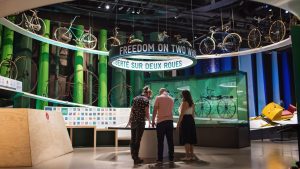A local entrepreneur believes a powder made of fine aluminum particles is the raw material that will build Ottawa’s next billion-dollar company.
Kevin Nicholds is the president and CEO of Equispheres, a three-year-old startup. He thinks his firm just might have discovered the Holy Grail of 3D printing: A metallic powder that can be used to consistently create products such as airplane and automotive components – and even human body parts – that are stronger, lighter and more efficient than anything now on the market.
A growing number of investors and potential customers – including some of the world’s largest aerospace companies and automakers – are betting he’s right.
OBJ360 (Sponsored)

Foster employee wellness and show your appreciation with Ingenium
Helping employers better connect with employees, and their families, is the thinking behind the corporate memberships offering from Ingenium.

Foster employee wellness and show your appreciation with Ingenium
Helping employers better connect with employees, and their families, is the thinking behind the corporate memberships offering from Ingenium.
Lockheed Martin recently announced it is pumping US$5 million into Equispheres to help the fledgling firm develop cutting-edge materials at its Kanata headquarters. That brings the company’s total funding haul since its inception to more than $24 million in Canadian funds – most of it from well-heeled Ottawa angels, as well as a number from Calgary and Toronto.
Not bad for an operation that started generating revenue just a couple of months ago.
“They’ve often said that it’s the best-kept secret in Ottawa,” Nicholds says, describing his investors’ reaction when they find out what Equispheres is doing.
“(The company) has raised $18 million (from angels), it’s got global interest. I guess it’s just sort of the magnitude of the opportunity, the pace that the company has (set) and the kind of people it’s attracted.”
Nicholds and his team have spared no expense in their effort to become world leaders in the metallic powder industry, which he predicts will be worth billions of dollars in the next five to 10 years. Since its launch, three-quarters of the company’s spending has been devoted to research and development, and about half of its 30 or so employees are scientists and engineers.
The result of their labours, Nicholds says, is a free-flowing powder made of particles that are almost perfectly spherical and uniform in size, making them ideal for creating customized metal objects in 3D printers.
During the printing process, a tiny laser thinner than a human hair effectively fuses the metallic particles together in layers to “print” an object. Existing powders typically feature fragments of various shapes and sizes, which makes them less likely to form a strong, consistent bond, Nicholds explains, using a popular children’s toy as an analogy.
“If you were making a part out of Lego, but all your Lego blocks were different shapes and sizes, it would be hard to make a good structure,” he says.
The longtime businessman predicts printed metal parts could revolutionize health care in addition to the aeronautics and automotive industries. He foresees a day when replacement knees, hips and even vertebrae could be custom-designed for each patient.
“At some point, who’s going to want off-the-shelf (body) parts?” he says. “People are going to want parts for their body that are unique.
“Since nobody’s ever produced powder like ours before, nobody knew what it could do.”
– Equispheres CEO Kevin Nicholds
“Since nobody’s ever produced powder like ours before, nobody knew what it could do. It’s opening up whole new ways of printing things or repairing things that weren’t possible before. It’s kind of reinventing design.”
It’s also a high-tech twist on a centuries-old industry that’s near and dear to Nicholds’ heart. Before launching Equispheres, he was president of Dollco Integrated Print Solutions, a local company that was owned by the Nicholds family for three generations.
After selling Dollco to the Lowe-Martin Group in 2012, Nicholds left the business the following year. He and his buddy Jeff York, the head of Ottawa-based food retailer Farm Boy, were brainstorming new opportunities when they had an epiphany: 3D printing was the future, but no one had yet come up with a viable way to consistently churn out products made of metal.
After spending the first year in stealth mode experimenting with their product, Nicholds and his co-founders knew they were really on to something when the company issued a news release in 2016 with magnified photos of the tiny aluminum particles.
Right away, the phone started ringing.
“Within two weeks, we had two dozen billion-dollar companies reach out to us,” he says with a grin. “The best of the best in the world looked at it and they said, ‘That’s incredible. How did you do that?’ We were kind of shocked that it had that level of interest. That’s when we sort of put all of our marketing plans in the bucket because now we had an issue of supply, not an issue of demand. We had all the customers we could ever hope for.”
Since then, the firm has continued to pour time, money and human resources into preparing its powder for mass production. Nicholds says Equispheres is working with partners in Canada and around the world on its patented technology, including about half a dozen universities, the National Research Council and some of those aforementioned billion-dollar companies, though he won’t divulge which ones.
‘Race to scale’
Building a viable business in such a research-intensive industry is not without its challenges, he explains. It calls for a deep pool of talent and capital and, just as importantly, endless reserves of patience.
“We’re just in a flat-out race now to scale,” Nicholds says. “It’s no longer, ‘Will this work, will people care?’ Now it’s, ‘How fast can we get to market?’
“It’s a new process. It takes six, 12 months to get validation from different customers.”
For now, Equispheres plans to focus on a core of about 10 major customers while it finds its footing. But interest in the firm continues to grow, Nicholds says, noting officials from a “major European automaker” jetted to Ottawa to tour the plant a couple of weeks ago.
A wider range of powders made of metals such as titanium are also in the works, he adds.
“We don’t want to be half-good at 10 things. We want to really get a wedge in the market and say, this is the world’s best (aluminum) powder and it works great, and now we’ll work on the other materials.”
Equispheres is aggressively hunting for more capital, Nicholds adds, so it can “make hay while we’re unique.”
He’s currently wooing VC investors south of the border and expects to land up to US$25 million in a new round before the end of the year. The firm expects to use much of that cash to boost its R&D department as well as beef up its sales and marketing team, and Nicholds expects the firm to employ between 50 and 60 people by this time next year.
Eventually, he foresees eight-figure annual revenues and a billion-dollar valuation. He knows he’s not the first Ottawa entrepreneur to make such a prediction, and he certainly won’t be the last. But he’s prepared to stand by his bold prognostication.
“I’d never want to chase sales, but when you look at the size of the market, the value-add of our product and the adoption, if we can execute and scale as fast as we want to, then I don’t think it’s a crazy (prediction),” he says.
For the dyed-in-the-wool Ottawan, accomplishing all that in his hometown would be the icing on the cake.
“We’re a nice story,” Nicholds says. “It’s all export, high-value added, using Canada’s core strengths. It just checks all the boxes of what Canada says it wants to achieve.”





